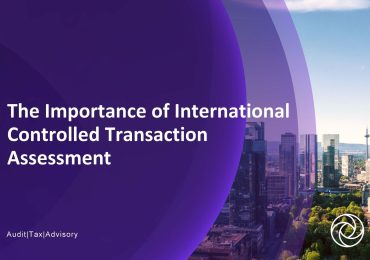In the year 2021, the world will again face an extraordinary crisis – namely the post-pandemic economic stagnation of the global economy. Many developed countries may be able to get out of this crisis with relatively minor losses, but the severity of the economic downturn is much worse in developing countries and it is still hard to forecast the exact situation that these countries will be in over the next two to three years.
There is a possibility that the scale of the negative impact, especially on the SME sector of developing countries, is not yet visible due to temporarily postponed tax and loan payments as well as government assistance. Nonetheless it will be devastating for many economies and may even be a cause of political unrest in these countries.
This article aims to present some innovative ideas to attempt to deal with the post-pandemic economic crisis, identifying new ways to save the SME sector in developing courtiers, as well as identifying untapped potential for a relatively fast recovery– such as the structural reform of State-Owned Enterprises and new formulas of PPPs that may replace the decreasing amount of Foreign Direct Investment (FDI) flowing into the developing world.
Currently, almost all developing countries are struggling with economic downturn, an increase in debt, the loss of jobs, a decrease in FDI and most importantly significant shrinkage of the SME sector, which going forward may be a cause for political turmoil. The SME sector is contracting at a much faster pace than economies as a whole – large companies, multinational corporations and oligarchs are taking their place in the market.
This may not yet be visible in the statistical data, but towards the end of 2021, once loan repayments are due and taxes need to be paid, a big portion of the SME sector in the region may face bankruptcy. Developing countries in Eastern Europe and post-Soviet Union nations are facing a higher degree of “oligarchisation”, which will not be positive for the economies of these countries or for political development in the region.
Considering the above, the top priority of International Finance Institutions (IFIs) in the post-COVID environment should be aimed at saving SMEs.
POST-COVID SME FUNDS
Over the past year, many developing countries have come up with financial aid schemes for SMEs – postponing or freezing tax payments, the banking sector giving loan repayment holidays and channeling funds from state budgets to the private sector to help SMEs survive.
The problem with these schemes in many cases (not in every country) is a lack of predictably and clarity of the rules. The SME sector does not know what to expect within the next 3-6 months (e.g., what kind of government assistance, or new government regulations may be introduced due to the Coronavirus pandemic). An even bigger problem than this lack of clarity is the increasing possibility of corruption, and as a result, funds not reaching the desired entities.
This may be a good place for IFIs to step in and help governments to create COVID-19 SME Funds – alongside governments co-financing these funds (for instance, at a ratio of 50:50), as well as applying clear and transparent rules for all. The aid should come in the form of long-term, subsidized loans with a two-year grace period and interest rates matching the yields of countries’ sovereign bonds traded on international stock markets.
The size of the loans for each company could be determined based on the company’s revenue or taxes paid in 2019, and different sectors should be entitled to different percentages. For example, the HORECA (Hotels, Restaurants and Cafes) sector may be entitled to a higher percentage of the taxes they paid in 2019 (because they were the hardest hit), SME companies in the retail sector – to a lower percentage, SME companies in the construction sector – to even a lower percentage, and so on.
The principle should be transparent rules for all. Every entity should know exactly what they are entitled to and how is it calculated to create a level playing field for all and minimize the possibility of corruption.

CREATING A PME SECTOR (PUBLICLY TRADED MEDIUM SIZED ENTERPRISES)
Another equally important objective should be to look a couple of years ahead and help medium-sized companies in developing countries to attract equity. One of the biggest problems of the private sector in the developing world is a lack of equity.
Creating special products for medium-sized private companies to IPO on international stock exchanges or issue Eurobonds may be the biggest boost to the economies of developing countries – being the anchor investor, providing legal and financial advice, or even a special loan once a company issues a Eurobond or goes public on a stock exchange. These companies will be able to tap the resources of developed countries’ funds that are currently unavailable for developing countries, as most of them are only active as portfolio investors. It is already clear that FDI flow into developing countries is shrinking and going forward it needs to be replaced by portfolio investments –creating a PME sector may be the fastest way for developing countries to do so.
IFIs creating special products (co-financing pre-IPO expenditures and/or playing the important role of anchor investor) for medium size private companies of developing countries would motivate the owners of these companies to tap into funds available in international financial markets, which in turn will have a sizable impact on the economies of developing countries. These private companies will have to clean up their businesses before engaging with international markets, they will have to start paying taxes and adopt best practice for corporate governance. This will help many countries to solve a major problem of the private sector – attracting equity and transforming family businesses into corporate structures – which will allow these companies to grow faster, attract more and more funds from financial markets, merge with other companies more efficiently or acquire and sell their companies more effectively. At the same time, this transformation will help the respective countries build their risk profiles and PMEs will act as marketing agents for these countries.
An extra step for developing the PME sector in developing countries could be to create a specialized IFI Stock Exchange where IFIs will help medium-sized companies go public and attract equity from global financial markets by assisting with legal and financial services, or even by playing the role of the anchor investor or extending special loans in case of successful placement and at same time creating softer IPO rules (something similar to AIM London Stock Exchange). The IFI Stock Exchange can play the role of a steppingstone before going public (if successful) on the Warsaw, Frankfurt, or London Stock Exchange.
Many medium-sized companies in the developing world do not even dream of going public knowing that their size is the biggest constraint. With the help of IFIs (who have offices in all developing countries and who can lead this process for medium-sized companies on the ground), entrepreneurs will be able to take steps in the right direction, change their corporate structure from family-owned businesses to corporations, and then, in case of successful development, look for bigger opportunities.
IPPP – IFI-PUBLIC-PRIVATE PARTNERSHIP
Due to the pandemic, another significant problem that developing countries will face is a drop in FDI which is already visible. In the post-COVID era, PPP schemes focusing on FDI (not only on infrastructure) may be the way forward and IFIs can play a decisive role in this too.
It needs to be acknowledged that most of the IFIs have long started financing PPP projects and IFIs do partner up with private companies to invest in developing countries, but this is still not a widely applied approach.
The idea is to turn a big portion of IFI assistance into IPPP projects and on top of this, to use a specific formula that will ensure a competitive environment for choosing the private sector partner. Such an approach will use minimum IFI resources for any specific project, will ensure long term sustainability of any project through the transfer of it to the private sector and will minimize the possibility of corruption.
Instead of financing infrastructure, as well as new manufacturing and industrial development projects independently, IFIs can use the IPPP (IFI Public Private Partnership) approach involving private sector players who will manage projects and afterwards buy out other stakeholders be it a state or an IFI.
The idea is for IFIs together with governments to announce an expression of interest to find potential private investors who will provide equity for the project and will buy a part of the project – it can be a minority shareholder of an HPP or a majority investor in a factory, depending on government policy. The next step would be to announce an auction based on the following principles: Whichever company requests less equity, the lowest loan amount from an IFI or government and will come up with the highest investment. Equally, the tender could be a formula for establishing the price (e.g., PPA tariff of an HPP) and the equity requirement from an IFI or government (with the loan being fixed from an IFI). In this case, less funds will be spent by IFIs, the assets will be privatized from the very beginning or partially privatized and there will be a professional management team which is much more effective than state ownership.
Participation of IFIs will give the private sector additional comfort of being protected from political or geopolitical risks and will give stimulus to international investors to channel FDI into developing countries.
If managed well, this process should result in the most competitive pricing of projects and ensure that the least possible funding is needed from IFIs. To increase competition from the private sector, IFIs may even consider insuring parts of the project risk to make it Investment Grade (BBB) thereby increasing its attractiveness and capturing a much bigger pool of potential investors.
In the current situation, it should be the role of IFIs to contribute to the economic recovery of relatively poor countries, which can be more effectively done by opening developing markets to the widest possible range of private investments from the developed world either by bringing investors to the developing world, or by bringing projects/companies from developing countries to the marketplace where the biggest investment funding is available.
FDI is crucial for the developing world, not only due to the inflow of funds and to cover Current Account Deficits, but also more importantly because of “know-how” transfer, which in turn enables long-term growth.
TRUE CORPORATIZATION OF STATE-OWNED ENTERPRISES (SOES)
SOEs are the source of the biggest inefficiencies in developing countries and the source of the biggest untapped potential to help these countries with the economic recovery in the post-COVID environment.
More specifically, SOEs are one of the biggest sources of corruption and squandered opportunities. Mostly they are used for political purposes – providing employment for the political elite, providing financing for political projects, or even playing a political role in international affairs, instead of being focused on efficient and effective management of recourses, being profit-oriented and innovative to achieve higher profit margins.
Currently, IFIs lend significant funds to SOEs directly or through state budgets. Instead of direct lending (or through state budgets), IFIs should put a condition that SOEs must issue a Eurobond on international markets or do an IPO within a specific time frame (it can be a minority or majority of the shares depending on government policies). In this case, on top of lending to SOEs, an IFI can play the role of the anchor during the transaction. IFIs should put as a condition to the loan (and a condition of being the anchor) that the management of the SOE will be paid based on the Eurobond spread (between Sovereign and the SOE) or based on the share performance in case of an IPO, or maybe even being partially remunerated by shares which can only be vested once leaving the job – in order to make sure that it is in the interest of the management to take a long-term view on the company.
WHY IS THE AFOREMENTIONED SCHEME IMPORTANT?
First, every transaction of an SOE on the international financial market helps the respective country to draw up its risk map. Different types of risks–sovereign, sub sovereign, Eurobonds, shares of companies, of financial institutions, etc.–are valued by global financial markets which will help other private companies of the same country to better attract investors, or will help local banks to attract cheaper resources, in turn affecting local interest rates. When there exists no risk map of a country, it only increases the risk for investors and hence increases the price of loans and decreases the price of assets.
Secondly, the management of SOE’s when being remunerated through stock options or Eurobonds yield spreads will mean these companies take a different approach – they will try to solve inefficiencies, avoid involvement in politically motivated projects, political appointments or political financing and the governments will also be aware that any activity by an SOE beyond its profile may affect its share price or Eurobond price and by doing so the government’s own standing will be affected negatively. The management will have to clean up the company, adopt transparent policies and use the best international standards of corporate governance.
Thirdly, these managers at the same time become international marketing agents for the government and for the country itself. Their remuneration depends on the price of the paper on the international market, which means that they must communicate with investors on a regular basis providing them with the relevant information about the country. Importantly, investors are also interested in creating the best venue to promote the country and its new positive developments, which in other cases might be irrelevant for these investors.
Despite many mistakes and much criticism, it should be acknowledged that over the past few decades IFIs have been successful in helping developing countries to grow and to fight poverty. And there have been a few shifts in the policies of IFIs which mostly proved effective.
Now, with the pandemic greatly damaging the existing economic policies of developing countries, IFIs need to adapt to new realities and reshape their policies. Saving the SME sector and assisting developing countries in attracting new investment, cleaning up their SOEs and designing transparent rules for financial aid may be the best role that IFIs can play in stimulating a recovery from the COVID-related economic crisis.
Forbes Georgia: სარედაქციო გუნდი
















